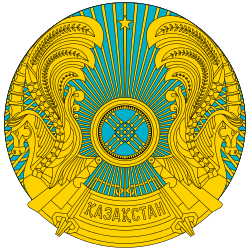Kazakhstan–European Union relations
 |
|
European Union |
Kazakhstan |
|---|---|
European Union–Kazakhstan relations are the international relations between the Republic of Kazakhstan and the common foreign policy and trade relations of the European Union.
Partnership and Cooperation Agreement
EU-Kazakhstan bilateral relations are governed by the 1994 Partnership and Cooperation Agreement (PCA).[1] Enhancements to Kazakhstan's partnership and cooperation with the European Union and its member states were ratified by the Kazakh Parliament in March 2016.[2] Kazakhstan is also part of the EU and Central Asia Strategy for a New Partnership.[3]
Cooperation Council
The Cooperation Council between Kazakhstan and the European Union meets annually and is the body to carry out the bilateral Partnership and Cooperation Agreement.[4] The Cooperation Council and Kazakhstan discuss many issues of mutual importance such as political, judiciary and economic reforms, the rule of law, trade and economic relations, and regional stability.[5]
During the 15th session held on October 4, 2016, the Council welcomed the Enhanced Partnership and Cooperation Agreement.[6]
Trade
Since 2002, the EU has grown to become Kazakhstan's largest trading partner, being the destination of 40% of its exports. Those exports were primarily, 80%, oil and gas in 2007. In 2007 EU imports of goods from Kazakhstan amounted to €13.35 billion and services amounted to €1.52 billion. EU exports to Kazakhstan were €6.04 billion in goods and €1.92 billion in services. Half of Kazakhstan's $7.3 billion of foreign direct investment in 2006 came from the EU. As a major energy supplier to the EU, the EU supports its accession to the World Trade Organization.
The EU is Kazakhstan's biggest trade partner.[7] In 2014 more than half of Kazakhstan’s total trade is with the EU—some $53.4 billion in 2013 and $28.4 billion in the first half of 2014.[7] More than half of Kazakhstan's gross foreign direct investment, or nearly $100 billion, has come from EU countries.[7]
Kazakhstan's exports to the EU are heavily dominated by energy, and exports from the EU are dominated by machinery and transport equipment, as well as products within the manufacturing and chemicals sectors.[8]
In bilateral meetings with British Prime Minister David Cameron in London, Kazakhstan President Nazarbayev signed 46 treaties worth over USD 13 billion in trade value.[9]
The EU is Kazakhstan's primary trade partner, and its largest export market. In 2014, trade to the EU was worth EUR 31 billion (36%). The EU is also thelargest foreign investor in Kazakhstan, representing over 50% of FDI in Kazakhstan (2014).[10]
Cooperation
The Partnership and Cooperation Agreement (PCA) with Kazakhstan has been the legal framework for EU–Kazakhstan bilateral relations since it entered into force in 1999. In November 2006 a Memorandum of Understanding on cooperation in the field of energy between the EU and Kazakhstan has been signed establishing the basis for enhanced cooperation. Kazakhstan recognizes increased economic and political integration as key to its modernization and development.[11]
The future European Commission assistance will focus on the following priority areas: promotion of the ongoing reform process at political, economic, judiciary and social level, infrastructure building, and cooperation in the energy sector.
The overall EU co-operation objectives, policy responses and priority fields for Central Asia can be found in the EC Regional Strategy Paper for Central Asia 2007–2013. In addition to the assistance under the Development Cooperation Instrument (DCI), Kazakhstan participates in several ongoing regional programs.[12]
The Cooperation Council between the European Union (EU) and Kazakhstan held its fourteenth meeting on Tuesday, March 3, 2015.[13] The meeting was chaired by Kazakhstan's Foreign Minister Erlan A. Idrissov, and the EU delegation was led by Latvia's Foreign Minister Edgars Rinkēvičs. The EU reiterated its support for the membership of the Republic of Kazakhstan of the WTO.[13]
In 2014, Kazakhstan became the first Central Asian country to join the Asia-Europe Meeting (ASEM).[14]
Human Rights Dialogue
In April 2008, Kazakhstan and the EU marked an agreement to begin human rights dialogue. Human Rights Dialogues are an instrument of the EU’s external policy and are designed to discuss questions of mutual interest and enhance cooperation on human rights, as well as launch initiatives to improve the relevant human rights situation. In line with this agreement, the EU held its first structured dialogues on human rights with Kazakhstan in October 2008.[15]
References
- ↑ "EU-Kazakhstan relations - Factsheet". europa.eu. European Union. Retrieved 23 February 2016.
- ↑ "Kazakh parliament ratifies accord on broadening partnership with EU". Interfax.
- ↑ "EU - Kazakhstan". European Council Newsroom.
- ↑ "Kazakhstan's Deepening Ties with Europe". CACI Analyst.
- ↑ "EU-Kazakhstan: first Cooperation Council since signature of the enhanced partnership and cooperation agreement". New Europe. European Council.
- ↑ "EU-Kazakhstan: first Cooperation Council since signature of the enhanced partnership and cooperation agreement". www.consilium.europa.eu.
- 1 2 3 Nazarbayev, Nursultan. "The Next Chapter in Kazakhstan-EU Relations. Bolstering development and trade through a new partnership agreement.". Wall Street Journal.
- ↑ "EU-Kazakhstan bilateral trade and economic relations". European Commission.
- ↑ "President of Kazakhstan Nursultan Nazarbayev and UK Prime Minister David Cameron participate in the II Session of the Kazakh-British Intergovernmental Commission (IGC) on Trade and Economic Cooperation".
- ↑ "EU-Kazakhstan relations - Factsheet". europa.eu. Retrieved 23 February 2016.
- ↑ "Kazakh president discusses co-operation expansion with Commission". Eureporter.
- ↑ European Union and Kazakhstan. European Commission: External Relations
- 1 2 "Fourteenth meeting of the Cooperation Council between the European Union and Kazakhstan". European Council Council of the European Union.
- ↑ "ASEM - Kazakhstan page". ASEM.
- ↑ "EU human rights dialogues in Central Asia" (PDF). eeas.europa.eu.
